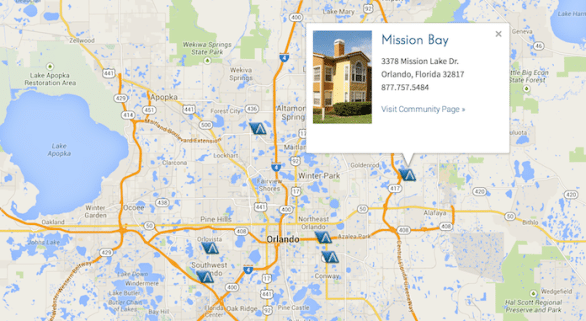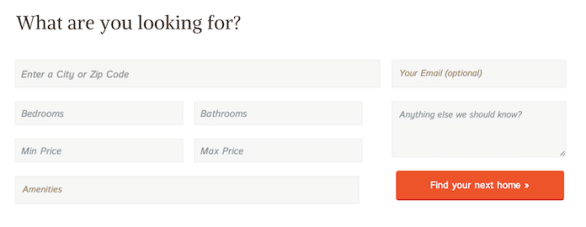Multifamily Blogs
"I need a 1-Bedroom near downtown." The Missed Opportunity in Your Marketing Strategy
"I need a 1-Bedroom near downtown." The Missed Opportunity in Your Marketing Strategy
“Hi, I’m looking for a one-bedroom, maybe a studio, near downtown. It looks like you have a few properties with nice options. Who would I call to set something up to see your apartments? Thanks, Kate”
This is a real message received through a client's Facebook page. We see messages like this a lot, coming through a social media channel or the client's website. There's a good chance you've seen messages like this, too.
It’s great news. "A lead! She wants a studio. We need to rent some studios!"
Except there’s a problem.
Our organizations aren’t built to serve Kate's question very well. Our marketing strategies don’t address what she needs at this point in her search. The way we manage leads doesn’t enable our leasing teams to give Kate what she wants. And it’s holding us back from providing a better leasing experience for our prospects.
I know what you’re thinking. “Business is good. We have more leads than we know what to do with. We need to focus on getting our leasing team to answer the phone more and respond to online leads.”
All true.
But the more you can do to move "up the funnel,” the sooner you can qualify the prospect, identify your best prospects and ultimately help them find their perfect place.
Let me show you what I mean.
If you break down how people shop for apartments, we see that very few know the property they want by name when they start their search (top of the funnel). A few might, but these people are certainly a small minority.
[Side note: In general, the apartment industry has never done particularly done well at brand marketing. Sure, we create unique “brands" for each property — complete with identity packages, signage, branded social accounts and a whole lot more — but very few properties ultimately succeed at communicating why their brand is better for the customer. We want the prospect to see value in our property’s brand, but they often don’t. (It’s not unique to apartments, either. Regardless of industry, building a brand that people know and want to be associated with is hard.)]
Your prospect doesn't know you yet
Most prospects know when they’re moving, what part of town they’d prefer, and a general budget. They know what they like when they see. But very rarely do they have their heart set on a specific property out of the gate.
Take Kate, for example.
She probably started her search on Google. Or maybe Craigslist.
She bounced around the funnel, moving to one or more apartment listing sites (the ILSs). She narrowed down her options, probably checked out a ratings sites and eventually landed on the company website.
She saw that the company offers six properties in the area that she wants to live, but she’s not familiar with any of the individual properties. Rather than contacting a specific property, she contacted the corporate office by filling out the main “Contact Us” form on the website.
No one at corporate is equipped to route her response properly. “Which property should we send her to? Who’s going to get back to her? Um, just have XYZ get back to her."
Kate is frustrated. She thinks these properties look great, but she’s tentative. She just needs a little guidance, someone to steer her in the right direction.
Looking for some help, she visits the company’s Facebook page, which is where our community manager received the question at the top of the post. The client’s account manager here immediately shoots the note over to our contact, the Marketing Director. So we’re back at the corporate office, waiting for the message to get filtered through the company so we can get back to Kate with a helpful reply.
We’re making it harder than it needs to be.
Now compare this to what the ILS partners are doing. They know exactly how consumers shop for apartments. It's their business to know.
They know consumers start at Google, so they invest heavily in organic SEO and paid search. At a recent conference, a marketing executive for one of the top ILSs went through how visitors enter their site:
“Our top pages are the local search results pages. Then it’s the individual property details pages. Then our homepage."
That matches Kate’s shopping experience. Even if she knows a couple properties by name, she wants to see what else is in the neighborhood — she wants to see what her options are before she narrows down her list.
This. This is the opportunity we as apartment marketers have all but conceded to the ILSs.
But it doesn’t have to be this way.
Sell the choices. Then help them choose.
Don’t misunderstand. This isn’t a post bashing the ILSs. This is a plea for us as smart apartment marketers to provide a better shopping experience to the prospect.
Regardless of your marketing plan or your target audience, here are a few things every apartment company can be doing to provide a more efficient (and more profitable) leasing experience.
Invest more in your corporate site.
Take cues from the ILSs. They know that people want to see options. They know prospects search by location.
- Incorporate map-based search. Location is one of the top criteria that prospects use to filter their search. You can’t see where properties are located when they’re in a straight list down the page. Give your prospects the option to see where your properties are located on the map.
- Build detailed neighborhood pages. And I don’t mean showing “What’s nearby.” Sure, it’s great to show local restaurants and how close you are to nightlife and the grocery store, but your prospect is looking for an apartment. Show her all the options you have available in each neighborhood, and help her decipher which property might be the best option for her.
- Build keyword-targeted landing pages. SEO is a matter of providing content that is as relevant as possible to what the customer types into the search engine. So if we know that people are more likely to search for “1 bedroom apartments in Lakeview”, we should have content on the website that directly matches that phrase. Why do you think the ILSs get more traffic to the neighborhood pages that the property details pages? This is why.
- Allow visitors to save and compare options. Preferably without creating an account. Keep this simple.

Collect leads earlier in the process.
Prospects like Kate don’t really know which property is best for them. Once you get her to your website, help walk her through the process. Look for ways to get her to raise her hand as an interested prospect before she ever has to select a specific property. Try putting a contact form on your homepage or those awesome neighborhood pages that you’re building.
Offer to help go through the options to help Kate find her perfect place. Provide a free moving checklist or questions to ask while she’s touring apartments. Provide a coupon waiving the application fee. Find some way to provide a compelling offer on every page of your website — one that matches the buying stage of the prospect. (You don’t need “Apply Now!” on every page.)
What if you collected the prospect's contact info in an unobtrusive way, as part of every search on your site? Get creative with this!

Be the local expert.
Have someone on your team who knows the local sub-market better than anyone else. Make him or her the go-to person on living in the area. Keep up on new businesses and local issues that impact residents, like parking and construction.
Ask good questions that help you steer the prospect in the right direction, and don’t be afraid to refer the occasional lead to a competitor if you know they’d be a better fit.
You've heard the adage: People do business with people they know, like and trust. And the more you’re able to help your prospect throughout her search process, the more likely you’ll be the first place she recommends when her friends need a place to live.
Change the way you manage leads.
This one could be the biggest limitation to this approach.
Every lead management tool I’ve seen for the apartment industry requires that a lead be assigned to a specific property. Every. Single. One. This doesn’t leave us many good options when we get a request like Kate’s.
We need a lead management solution that allows leads to be assigned to a neighborhood specialist, maybe a position filled by a floating leasing professional. Ideally this would be a single point of contact, because I’m pretty sure Kate doesn’t want to deal with four separate responses from four different properties.
If we’re collecting leads earlier in the process, we need to make sure that we have the systems in place to properly serve those leads and answer their questions … not force them to blindly select a property simply because that’s the only way we can respond to a request.
Share your availability between properties.
Similar to the floating leasing consultant, you may want to give the leasing staff at each property the visibility to see pricing and availability at nearby sister properties.
“We don’t have a one-bedroom, but our sister property has exactly what you’re looking for, and they’re just on the other side of the neighborhood. Can we go ahead and schedule a tour for you over there?”
Some companies already do this, and I'd say they're ahead of the pack. Again, this might require reexamining tools like your property management software (and maybe how you compensate your leasing teams), but isn’t that a good thing if it’s aligned with what your customer needs?
The benefit of digital marketing is that we get to see the data. We can use it to identify insights like this. We can use it to gain a much better understanding of how prospects are looking for apartments.
And we can adjust course to better serve the customer. It’s time to apply what we’ve learned. We need to make some changes to the way we market our businesses to give our properties the best opportunity to reach the prospect.
That way, we’ll know exactly what to do when the next Kate needs a one-bedroom near downtown. Let’s help her find that one-bedroom of her dreams, as painlessly as possible. Who’s with me?


